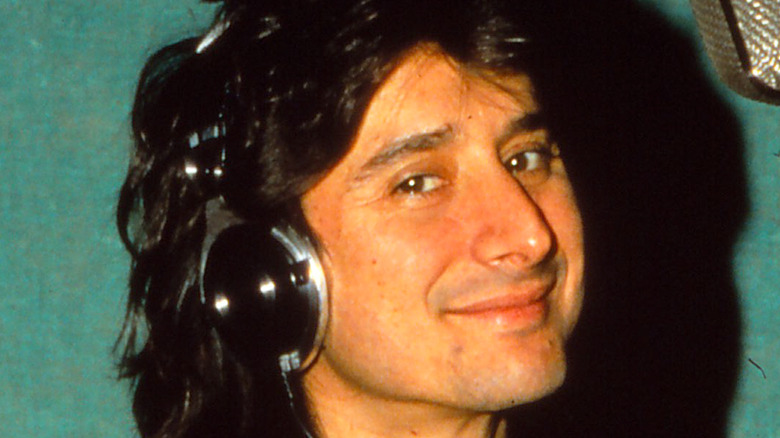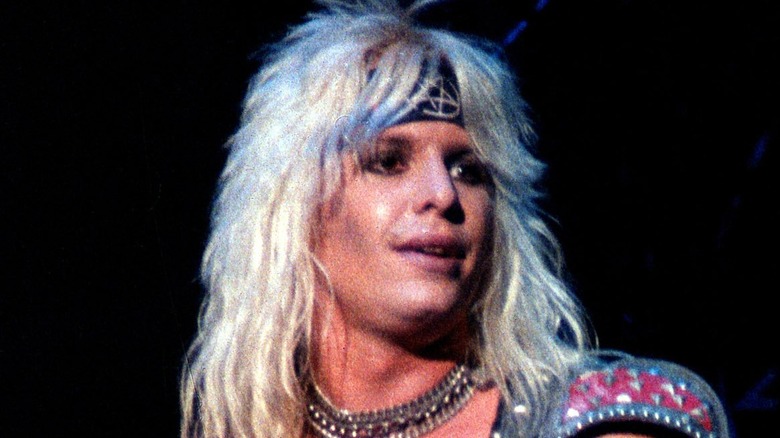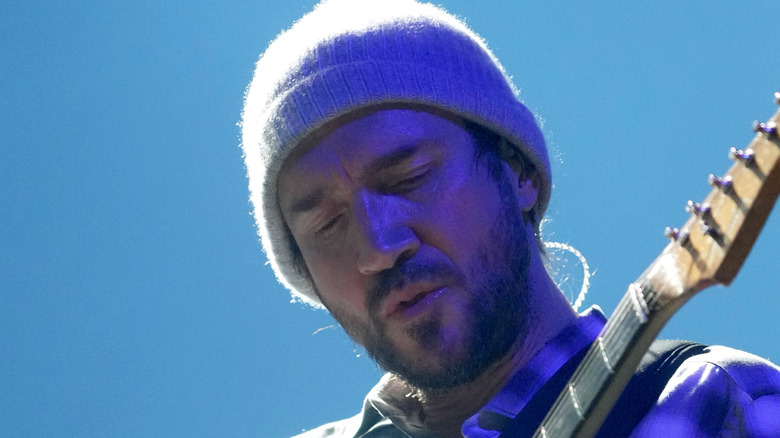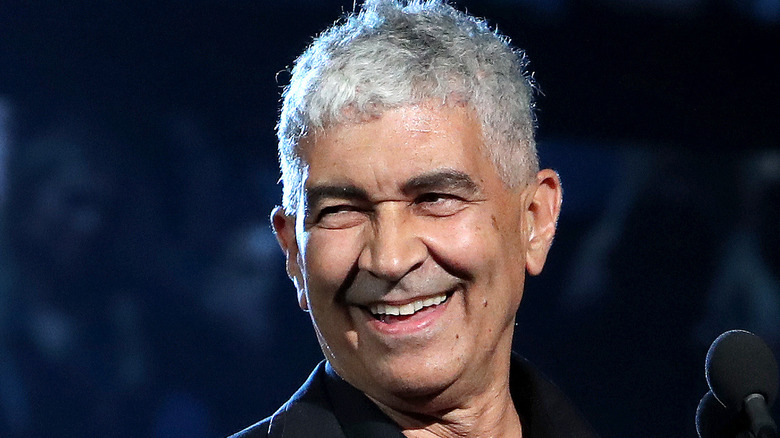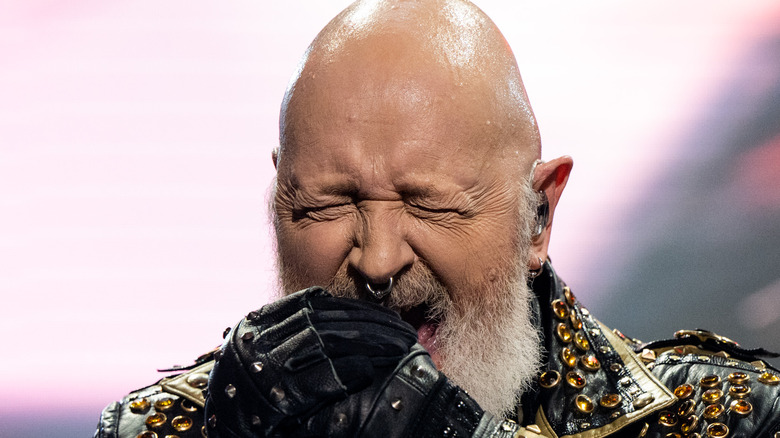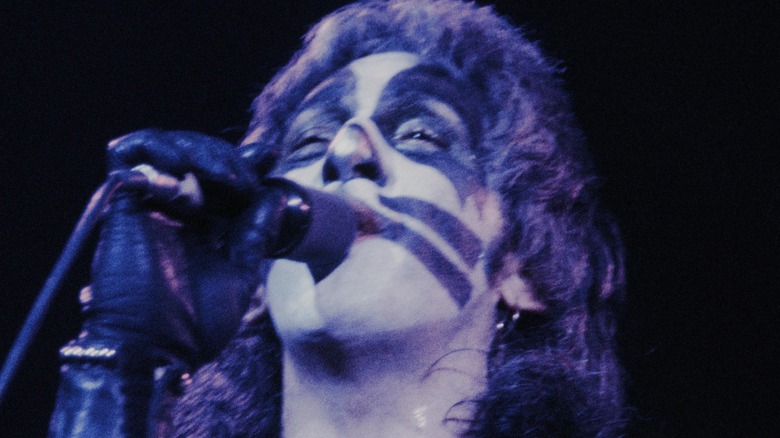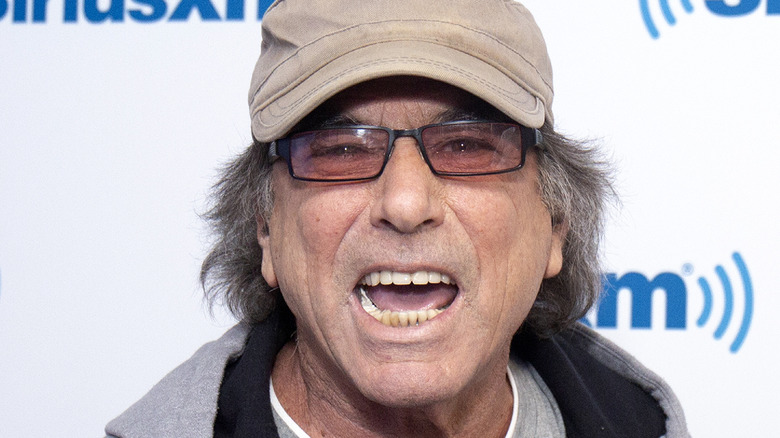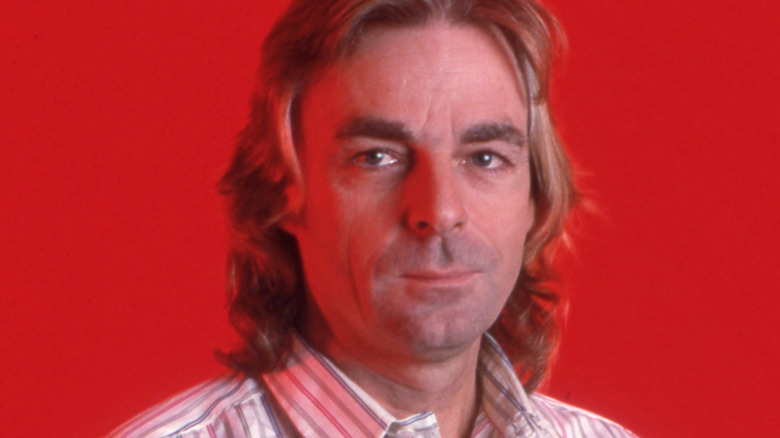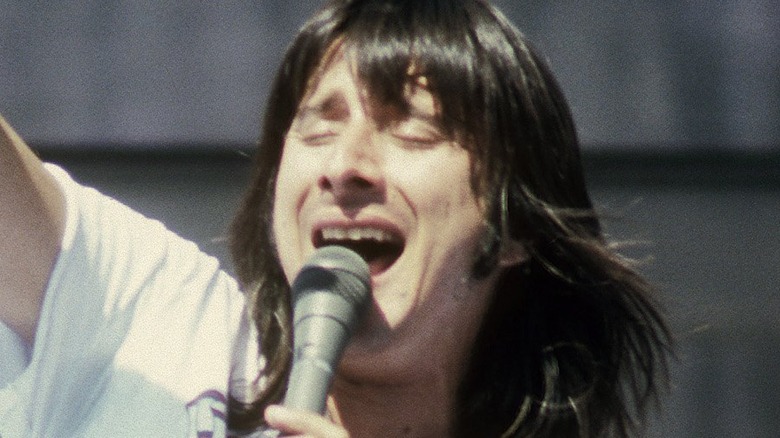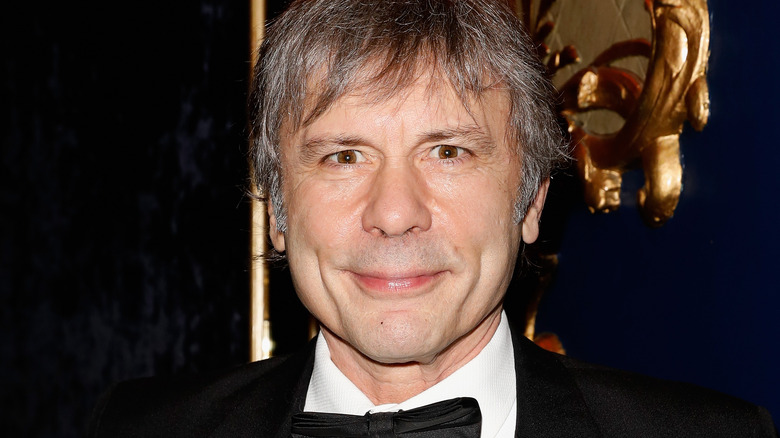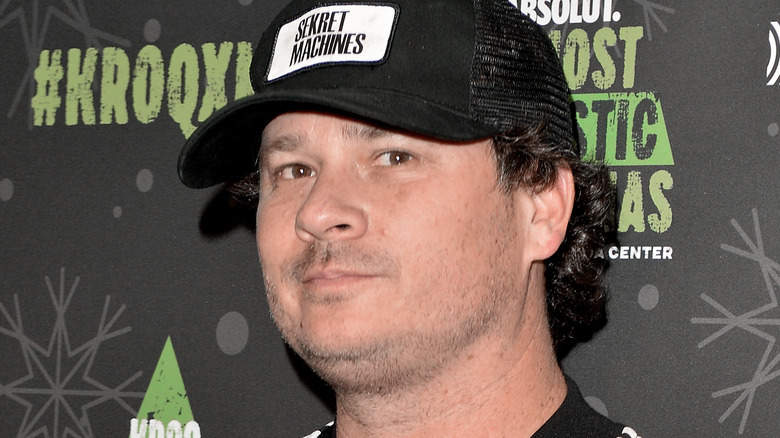Musicians Who Left Their Bands, Only To Come Crawling Back
Being a member of a successful rock band is an enjoyable and wonderful thing, but it can also be very stressful. Forming a band with friends and riding your skills and talents to global fame and untold fortune is tough work, and creative and professional tensions can develop. Problems between bandmates can get so out of hand that a core member might decide they've had enough of the thing that made all their dreams come true, and they'll bolt, either for a solo career or just something way less intense than being an integral part of a successful band.
This is a tale as old and familiar as rock music itself. A little bit rarer is the story of the triumphant return. It doesn't happen very often, but every now and then, a famously and tumultuously departed member of a successful band will return to the group. Maybe it's not how they thought things would go, but at any rate, it takes a certain amount of pride-swallowing and maturity to ignore all the drama that led to the split, and to let bygones be bygones enough to go back into the fray. Here are some of the biggest band separations — and subsequent and very unlikely reunions — in music history.
Vince Neil - Motley Crue
After "Dr. Feelgood" sold around 6 million copies, Elektra Records signed Motley Crue to a $25 million contract in 1991. Shortly thereafter, grunge replaced hair metal as the sound of the moment, and singer Vince Neil left the band. According to the group's autobiography "Motley Crue: The Dirt," Neil would go out drinking so much that he'd show up late or not at all for rehearsal sessions. After one such incident in February 1992, the band told Neil they were considering replacing him, leading him to storm out of the studio. "He says he was fired," bassist Nikki Sixx wrote. "I say he quit."
John Corabi sang on Motley Crue's self-titled 1994 album, a commercial disappointment with a support tour that left the band playing to sparsely populated arenas and small clubs. After his exit, Neil told the Tampa Bay Times, he spent four years attempting to reconcile with the bandmates he'd so deeply upset. Finally, he got everyone in a room together. "It was weird, but it was right," Neil said. And then, with Corabi departing on his own accord, Neil was back in the Crue, gratefully performing with the band on the 1997 American Music Awards. "I think that night was when I realized how much I love this band, even when I tried so hard to deny it," Neil said. "Actually, I don't think any of us realized how important it was."
John Frusciante - Red Hot Chili Peppers
Following stints by Hillel Slovak, Jack Sherman, and DeWayne McKnight, John Frusciante became the Red Hot Chili Peppers' fourth lead guitarist, joining the punk-funk outfit in 1988. Those are his licks on smash hits like "Give It Away" and "Under the Bridge," but success unnerved Frusciante. "'We're too popular. I don't need to be at this level of success...' John would say," singer Anthony Kiedis wrote in his autobiography "Scar Tissue." By the end of 1991, the guitarist and singer were no longer on speaking terms, and Kiedis believes Frusciante purposely performed poorly when the band appeared on "Saturday Night Live" in 1992. A few months later, Frusciante quit the Red Hot Chili Peppers in the middle of the band's tour of Japan. Without Frusciante, the Chili Peppers struggled to find a new musical direction, with three guitarists serving short tenures.
In 1998, Frusciante enrolled in a drug rehab program. He'd successfully overcome a heroin addiction, but still needed treatment for alcohol and crack cocaine abuse, according to "Scar Tissue." After his discharge, bassist Flea asked Frusciante to be a Chili Pepper again. "John started sobbing and said, 'Nothing would make me happier in the world,'" Kiedis recalled. Frusciante then allowed Kiedis to call out any lingering resentments he may have had.
The guitarist played on three Chili Peppers albums, then left again in 2009. "I became quite off balance mentally those last couple of years," he told Classic Rock. But then Frusciante returned again in 2019, replacing his replacement Josh Klinghoffer.
If you or anyone you know needs help with addiction issues, help is available. Visit the Substance Abuse and Mental Health Services Administration website or contact SAMHSA's National Helpline at 1-800-662-HELP (4357).
Pat Smear - Foo Fighters
After the suicide of Kurt Cobain, Nirvana disbanded, and drummer Dave Grohl recorded an album almost entirely on his own, attributed to "Foo Fighters." When it came time to build a real band around that sound, Grohl recruited Pat Smear, a Nirvana auxiliary member, to be one of the group's guitarists. Following the release of the second Foo Fighters album, 1997's "The Colour and the Shape," Smear quit the band in part because of a spat with Grohl, according to The Guardian. The frontman had divorced his wife, Jennifer Youngblood, a close friend of Smear, and the guitarist couldn't get past that awkwardness. Smear also tired of the grind of being in a popular rock band. "I was just so sick of the whole thing," Smear said in the documentary "Foo Fighters: Back and Forth" (via Far Out).
To replace Smear, Grohl hired Franz Stahl, a fellow member of the 1980s hardcore outfit Scream, who stayed in the band for two years before he was fired, per NME. Chris Shiflett joined up, and then Smear patched things up with Grohl because he simply hated not being in the group. "Every time a new record would come out I would really miss it and I'd be like, 'Aw I wish I played on that,'" Smear told the National Post of his years away. After coming back first as a touring guitarist and then playing guitar as a guest on the 2007 album "Echoes, Silence, Patience, and Grace," Smear rejoined the group on a full-time basis in 2010.
Rob Halford - Judas Priest
Judas Priest started out as a hard-edged progressive rock band in 1969, but after the addition of operatic lead singer Rob Halford, the band became one of the progenitors of British heavy metal. Halford did his part musically and visually, with his soaring vocals about darkness, crime, aggression, and lust immortalized on songs like "Breaking the Law," "You've Got Another Thing Coming," and "Turbo Lover."
Halford left Judas Priest in 1992. "My exit was due to probably the similar circumstances as a lot of my friends, lead singers that I know that went on the same self-journey of discovery. I think it was important for me to do that," Halford told Rolling Stone of his departure and subsequent pursuit of a solo career. Judas Priest moved on, too, hiring Tim "Ripper" Owens as Halford's replacement, plucking him from a Judas Priest cover band.
In 2003, Judas Priest announced that Halford was back on lead vocals. That reunion came about because Halford deeply regretted leaving the band, and he missed his friends. So, he put his feelings out there, writing an emotionally raw letter to his old bandmates, seeking to reconnect. "I went into the coffee shop and bought a cup of coffee, sat outside with some blue paper and a blue envelope, and poured my heart out into what was six, seven, or eight pages of where I was at and what I was feeling," Halford told Metal Hammer. Halford met with the band to discuss the release of the 2004 box set "Metalogy," and was quickly taken back into the fold.
Peter Criss - Kiss
In the 1970s, the members of Kiss took on fantastical personae, reflected by their stage makeup. Along with Gene Simmons (the Demon), Paul Stanley (the Starchild), and Ace Frehley (the Spaceman), drummer Peter Criss was the Cat. He also sang lead on Kiss's biggest hit — the ballad "Beth" reached #7 in 1976. Nevertheless, Simmons and Stanley found Criss' drumming subpar, and made him audition in 1980 to keep his spot in the band, per Stanley's memoir "Face the Music." It didn't go well, and Criss departed.
After the drama and embarrassment, what brought Criss back into the band in 1995 was a combination of pity and the want of money. His solo career hadn't panned out, and according to Criss' memoir "Makeup to Breakup," Stanley and Simmons had been swindled by a manager. Thus, the duo agreed to perform at a Kiss convention and tape an episode of "MTV Unplugged," reaching out to former bandmates Frehley and Criss to join them for those onstage reunions. Criss adamantly refused the offer, but when Kiss' manager explained that the project could be lucrative, he (and Frehley) signed on. During the convention's mini-concert, Stanley and Simmons brought out Frehley and Criss, to the surprise and delight of the audience. "The energy in the room was just insane," Criss wrote. During his performance of "Beth," Criss glanced at Simmons. "He had that ca-ching gleam in his eyes again. He could just smell that money."
As could Criss — the 1996 Kiss reunion was the most lucrative tour of the year, per the The Washington Post.
Mickey Hart - The Grateful Dead
The Grateful Dead required the services of two drummers. One of them was Mickey Hart, who joined the band (and other drummer Bill Kreutzmann) in 1967. In 1970, band associates confronted financial manager Lenny Hart — Mickey Hart's father — about tens of thousands in missing funds. After paying back $10,000 (according to Rolling Stone), Hart disappeared with all of the Grateful Dead's cash on hand, temporarily preventing them from going on tour and earning a living. Lenny Hart was arrested in San Diego a year later, and a court convicted him of embezzlement. He spent six months in jail, and the Dead got back $55,000 after filing suit.
In that cloud of criminality and embarrassment caused by his father, Mickey Hart left the Grateful Dead in 1971. "Mickey took all of this the hardest," Kreutzmann wrote in his memoir "Deal." "The rest of us had just been ripped off by our manager, but Mickey had just been ripped off by his own dad." It would take Lenny Hart's death in 1975 to pave the way for Mickey Hart to rejoin the Dead in 1976. And while his bandmates were sympathetic, Hart still had to persuade them for reinstatement; Kreutzmann was the toughest to convince. "I didn't think it was a good idea," Kreutzmann wrote. But after everyone else had welcomed Hart back, Kreutzmann was too high on opiates to oppose it. "Instead of objecting like I wanted to, I just gave a very stoned, 'Okay, whatever you say.'"
Richard Wright - Pink Floyd
While preparing "The Wall," a 1979 two-disc concept album about mental illness, Pink Floyd's bassist and songwriter Roger Waters got mad that keyboardist Richard Wright wasn't pulling his musical weight. (Waters felt the same way, though to a lesser extent, about guitarist David Gilmour). While Waters devoted ample work hours to the project, Wright elected to spend as much time as possible with his children because he was in the midst of a divorce. "Both myself and Dave ... had little to offer, through laziness or whatever," Wright told Classic Rock in 2000 (via Far Out). "Looking back, although I didn't realize it, I was depressed." After considering suing his bandmate, Waters instead forced Wright out of the band, claiming he'd cancel "The Wall" entirely unless the keyboardist departed. According to The Guardian, Waters got his way, and Wright was out.
Just after his dismissal, Wright returned to Pink Floyd, willingly accepting a role with far less status, power, and input than he'd grown accustomed to. Pink Floyd brought Wright on as an employee — a salaried touring musician — rather than a royalties-earning full and official member of the band. Wright played on the "Wall" tour as a hired sideman, but since he wasn't a full partner in Pink Floyd, he actually made more money on the deal than if he'd stayed in the group. It cost more to mount the elaborate "Wall" tour than Pink Floyd wound up earning. All of the full-status members of the band thus lost a fortune — but not Wright.
Steve Perry - Journey
In the early 1970s, Journey was an experimental, instrumental jazz-rock outfit. In 1977, Journey shifted to a more commercial direction, hiring singer Steve Perry and finding massive success. In just 10 years, Journey released eight multi-platinum albums, and scaled the charts with one anthemic rocker after another, like "Don't Stop Believin'," "Open Arms," and "Separate Ways." Around 1987, according to GQ, Perry abruptly announced to the rest of Journey that he was done, effectively ending the band. "And I'm sure they thought, 'Oh, there he goes. Solo career. F*** Steve,'" Perry recalled. But he didn't release a new solo album until 1994; instead, he rested his voice and grieved his mother, who'd died while Perry was making the "Raised on Radio" LP.
Journey would reunite in the 1990s, and it was all Perry's idea. Out of the blue and feeling nostalgic and finally ready to rock again, Perry contacted each of his old bandmates and got them on board. Reconstituted Journey ultimately recorded "Trial By Fire" and prepared to hit the road for a tour. Then Perry went on a hike in Hawaii and found himself unable to walk due to excruciating pain. Facing hip surgery, Perry gave the rest of the band his blessing to tour with another singer but under a different name. Nevertheless, Journey — as Journey — reunited ... without the member who'd gotten them back together.
Bruce Dickinson - Iron Maiden
Since 1975, Iron Maiden has brought heavy metal to the head-banging masses. Bruce Dickinson wasn't an original member; he joined in 1981 as the band's fourth lead singer. It's his voice that fueled Iron Maiden's biggest successes, wailing his way through ominous, darkly fantastical songs like "The Number of the Beast," "Run to the Hills," and "Bring Your Daughter... to the Slaughter."
In 1993, Dickinson left the band, anxious to try other musical outlets. "I just thought that if I stayed with Maiden forever, all I would learn about was what it was like to be in Maiden," Dickinson said at a March 2022 speaking engagement (via Blabbermouth). Iron Maiden brought in Wolfsbane singer Blaze Bayley, and the two LPs on which he sang were the lowest-selling of the band's catalog to that point. Dickinson didn't fare much better with his solo gambit, landing just a few minor hits in the U.K.
At the end of the '90s, according to a documentary produced by Metal Voice (via Blabbermouth), Iron Maiden fired Bayley, displeased with his vocals. Band manager Rod Smallwood persuaded Iron Maiden guitarist and leader Steve Harris to ask Dickinson to return. "The thing is, we know Bruce and we know what he's capable of," Harris explained, "and you think, 'Well, better the devil you know.'" Per Mick Wall's book "Iron Maiden: Run to the Hills," Dickinson was also apprehensive about returning to the group he'd so emphatically rejected. But upon their first meeting, characterized with mutual reluctance, Harris and Dickinson slowly warmed to the concept of reuniting.
Tom DeLonge - Blink-182
Pop-punk trio Blink-182 sold millions of albums and were all over the radio and MTV's "TRL" in the early 2000s with hits like "All the Small Things" and "What's My Age Again?" The band took a hiatus in 2005, but it looked more like a split — guitarist Tom DeLonge formed Angels and Airwaves; bassist Mark Hoppus and drummer Travis Barker soldiered on as +44.
In 2009, Blink-182 announced a reunion, and released a statement (via Billboard) suggesting that personal acrimony had led to the long split: "Preparing to tour the world yet again. Friendships reformed." Barker had survived a brutal private plane crash the previous year, an impetus for the reformation. "We only got back together, I don't know, maybe because I almost died," the drummer told Rolling Stone. Six years later, the band fractured again, with Hoppus and Barker placing the blame on DeLonge. In a January 2015 statement (via Rolling Stone), Blink-182 said that DeLonge had quit, which the guitarist denied. Whatever the reason for his departure, creative and personal tensions in Blink-182 at the time were high; Alkaline Trio guitarist Matt Skiba joined the group in DeLonge's absence.
Years later, DeLonge once again put all of his negative feelings about his bandmates to rest because of a near-fatal event: Hoppus was diagnosed with cancer. Blink-182 announced a reunion with DeLonge in 2022, and in an Instagram post thanking his replacement, Matt Skiba, he explained his return: "Mark's cancer really put things in perspective."
